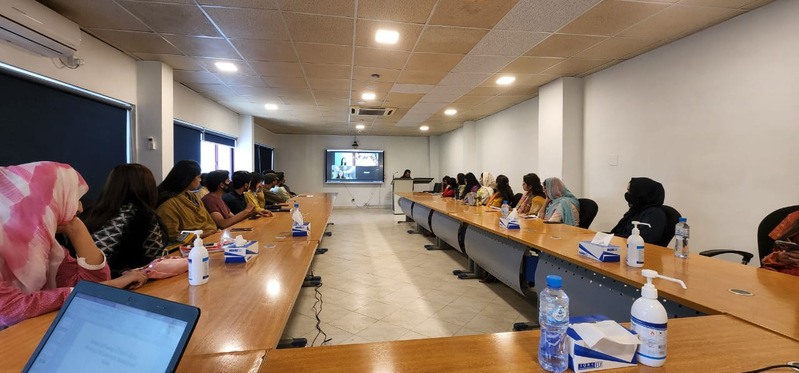Roundtable discussion on “Understanding China's Global Development Initiative (GDI) and Foreign Policy under President Xi Jinping’’
Jointly Organized by
Pakistan Research Center for a Community with Shared Future & IQRA University at IQRA University, Islamabad Campus
18th July 2022

On 18th July 2022, a roundtable discussion on “Understanding China's Global Development Initiative (GDI) and Foreign Policy under President Xi Jinping’’ was jointly organized by Pakistan Research Center for a Community with Shared Future & IQRA University at IQRA University, Islamabad Campus.
The aim of the Roundtable was to discuss China’s path to democracy in a new era under the visionary leader, President Xi Jinping. The roundtable discussion also integrated leading experts, researchers, and academicians to highlight China’s Global Development Initiative and prospects for collaboration with Pakistan.
Ms. Maryam Raza, Deputy Director, Pakistan Research Center for a Community with Shared Future explainedher expert analysis on ‘’Significance of Belt & Road Initiative (BRI) and Regional Connectivity’’. She stated that China had changed the socioeconomic landscape of countries through BRI. Now, BRI has gone beyond its boundary and its extended pillars are two main visions, i.e., Community with shared future and dialogue among civilizations. She also enlightened the audience about China’s policies for regional connectivity and broader alliances among states.
Ms. Hanyin Song, Lecturer in Urdu, Pakistan Research Center of School of International Studies, Communication University of China (CUC), Beijing, China shared her opinion on the topic ‘’Understanding China’s Global Development Initiative (GDI): Prospects and Opportunities for Pakistan’’. She stated that GDI will bring digital and industrial revolution along with poverty eradication and countering common threats. She explained that through GDI, every state would prosper equally with shared destiny and mutual assistance.
Dr. Ejaz Hussain, Associate Professor, Department of Social Sciences, IQRA University and Invited Researcher at Fudan University, shared his views on the topic “President Xi Jinping: A Visionary Statesman and Role Model for other Leaders”. He gave a detailed analysis from China’s independence to China’s re-entry in global institutions. He stated that due to exceptional policies and robust projects of economic alignment, President Xi Jinping has become a role model leader for other states. He also discussed China’s economic expansion under BRI and suggested ways for mutual cooperation.
Ms. Shan Dan, Lecturer majoring in Pashto and Regional Studies in the School of International Studies at Communication University of China (CUC) discussed“President Xi’s Grand Proposal: Building a Community with Shared Future and Dialogue of Civilizations”. She casted light on the importance of building a community with shared community. She also highlighted the Chinese foreign policy parameters. She discussed that China has been maintaining people-to-people contacts, cultural exchanges, and educational ties with many regional states.
Dr. Muhamamd Saad, PhD Wuhan University, China & Assistant Professor, Social Sciences Department, IQRA University, Islamabad discussed ‘’Relevance of China’s GDI in attaining UN Sustainable Development Goals (SDGs)’’. He explained that the Covid-19 pandemic has slowed down global development. However, President Xi’s timely proposal of GDI has brought immense benefits vis-à-vis to fulfill SDGs. He also highlighted major aspects, i.e., poverty reduction, food security and other areas.
The Roundtable discussion was moderated by Mr. Khalid Taimur Akram, Executive Director, Pakistan Executive Director, Pakistan Research Center for a Community with Shared Future. The event was attended by 30 students and participantsfrom the IQRA University.


Reported by PRCCSF
